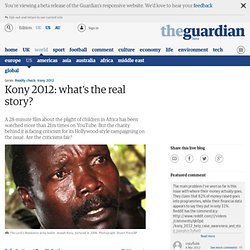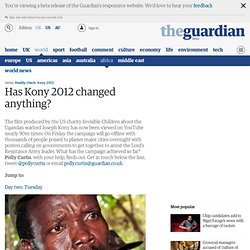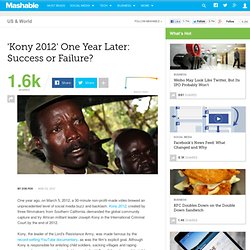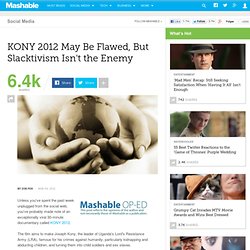

Kony 2012: what's the real story? Since Monday, more than 21m people have viewed this film – made by an American charity called Invisible Children – about the plight of children in Uganda at the hands of the warlord Joseph Kony, the leader of the Lords Resistance Army (LRA) guerilla group.

His group is said to have abducted 60,000 children. With its slick Hollywood production values, the film has been an almost instant viral success, dominating Twitter worldwide and having one of the fastest ever take-offs on You Tube. The hashtag #stopkony has had hundreds of thousands of tweets, and millions of people now know something about Uganda and what is happening to children there. Support for the campaign to end the conflict in the country this year is spreading. We've reported on the video here: Kony stands accused of overseeing the systematic kidnapping of countless African children, brainwashing the boys into fighting for him, turning the girls into sex slaves and killing those who don't comply. Peter Bradshaw writes: 2.05pm: Has Kony 2012 changed anything?
The Kony 2012 campaign promised to make famous Joseph Kony, the notorious Ugandan warlord whose Lord's Resistance Army is responsible for terrorising and kidnapping children, and forcing them to become soldiers.

The film about the campaign has now been viewed 90m times on YouTube alone after it went viral, primarily on Facebook. But while the internet can make a campaign, it can also break it, and there was a furious backlash against the depiction of the conflict and their tactics. 'Kony 2012' One Year Later: Success or Failure? One year ago, on March 5, 2012, a 30-minute non-profit-made video brewed an unprecedented level of social media buzz and backlash.

Kony 2012, created by three filmmakers from Southern California, demanded the global community capture and try African militant leader Joseph Kony in the International Criminal Court by the end of 2012. Kony, the leader of the Lord's Resistance Army, was made famous by the record-setting YouTube documentary, as was the film's explicit goal. Although Kony is responsible for enlisting child soldiers, sacking villages and raping women, he was never a household name in the U.S. until the release of Invisible Children's film.
KONY 2012 May Be Flawed, But Slacktivism Isn't the Enemy. Unless you've spent the past week unplugged from the social web, you've probably made note of an exceptionally viral 30-minute documentary called KONY 2012.

The film aims to make Joseph Kony, the leader of Uganda's Lord's Resistance Army (LRA), famous for his crimes against humanity, particularly kidnapping and abducting children, and turning them into child soldiers and sex slaves. As of Friday morning, the film has been viewed 70 million times on YouTube and Vimeo and received almost half a million comments. Uganda, LRA, Invisible Children and #stopkony, among other topics related to the film, have trended throughout the week on Twitter. Derrière la vidéo "Kony 2012", le marketing de l'émotion. Afrique - Déferlement de critiques contre la campagne Kony 2012. Slacktivists vs. Activists. Les médias sociaux et l’activisme désengagé. Photo : afagen Depuis le Web 2.0, l’apparition des médias sociaux dans nos vies a de toute évidence engendré des comportements socionumériques spécifiques à l’univers d’Internet.

Néanmoins, il ne fait aucun doute que plusieurs attitudes que l’on retrouve chez les internautes ne sont en réalité qu’une prolongation d’un comportement social déjà existant dans la vie hors ligne. Ce qui distingue les comportements virtuels de ceux que l’on dit réels, c’est que très souvent les comportements sur le web sont exagérés dû principalement à divers éléments, dont l’immédiateté et la spontanéité des réactions. L’interprétation des textes est également un facteur non négligeable dans la compréhension des comportements en ligne. Cette interprétation a un effet grossissant comme si le lecteur lisait tous les messages à la loupe ce qui lui donne l’impression que les autres soit lui lancent des fleurs ou soit lui donnent une énorme gifle. Le slacktivisme, un fléau pour les organisations caritatives. Apprendre aux activistes à contourner la censure.